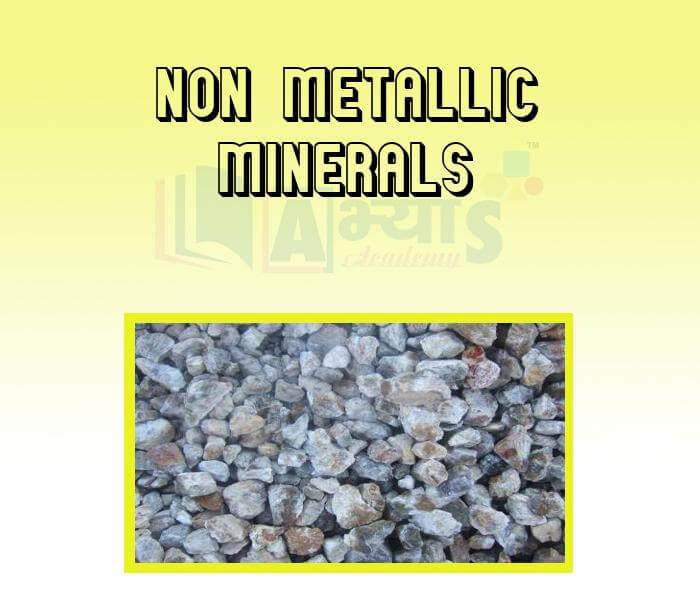Non Metallic Minerals










Non Metallic Minerals
Non-Metallic Minerals: The basic characteristic of non-metallic minerals is that they do not yield new products on melting. These are generally associated with sedimentary rocks. E.g. granite, sandstone, etc.
Mica: It is an important non-metallic, mineral. It is used in electrical and electronics industries due to its di-electric strength, insulating properties and resistance to high voltage. Mica occurs in the form of plates or leaves, which can be split into thin sheets. Mica can be clear, black, green, red, yellow or brown. Its deposits are mainly found in the Northern edge of the Chota Nagpur plateau. Koderma- Gaya- Hazaribagh belt of Jharkhand is the leading producer of mica. In Rajasthan, the major mica producing area is around Ajmer. Nellore mica belt of Andhra Pradesh is also an important producer in the country. Canada is the main competitor of India in mica production. India is one of the leading producers of mica. According to 2013 estimate, India produces 14,250 metric tonnes mica and stands at 8th position
Rock Minerals: Rock mineral like limestone is found, in sedimentary rocks and is composed of calcium carbonates or calcium and magnesium carbonates. Limestone is used for smelting iron ore in blast furnaces of steel plants and is the basic raw material for manufacturing of cement.
Meaning of Sedimentary Rocks : Sedimentary rocks are types of rock that are formed by the accumulation or deposition of mineral or organic particles at the Earth's surface, followed by cementation. Sedimentation is the collective name for processes that cause these particles to settle in place.
Match the following List 1 with List 2:
| |||||||||||||
| Right Option : A | |||||||||||||
| View Explanation | |||||||||||||
Koderma, in Jharkhand, is the leading producer of which one of the following minerals. | |||
| Right Option : B | |||
| View Explanation | |||
Non-metallic minerals are found in _______________ | |||
| Right Option : B | |||
| View Explanation | |||
Students / Parents Reviews [10]
It was a good experience with Abhyas Academy. I even faced problems in starting but slowly and steadily overcomed. Especially reasoning classes helped me a lot.

Cheshta
10thIt was good as the experience because as we had come here we had been improved in a such envirnment created here.Extra is taught which is beneficial for future.

Eshan Arora
8thA marvelous experience with Abhyas. I am glad to share that my ward has achieved more than enough at the Ambala ABHYAS centre. Years have passed on and more and more he has gained. May the centre flourish and develop day by day by the grace of God.

Archit Segal
7thAbhyas is a complete education Institute. Here extreme care is taken by teacher with the help of regular exam. Extra classes also conducted by the institute, if the student is weak.

Om Umang
10thIt has a great methodology. Students here can get analysis to their test quickly.We can learn easily through PPTs and the testing methods are good. We know that where we have to practice

Barkha Arora
10thOne of the best institutes to develope a child interest in studies.Provides SST and English knowledge also unlike other institutes. Teachers are co operative and friendly online tests andPPT develope practical knowledge also.

Aman Kumar Shrivastava
10thBeing a parent, I saw my daughter improvement in her studies by seeing a good result in all day to day compititive exam TMO, NSO, IEO etc and as well as studies. I have got a fruitful result from my daughter.

Prisha Gupta
8thMy experience was very good with Abhyas academy. I am studying here from 6th class and I am satisfied by its results in my life. I improved a lot here ahead of school syllabus.

Ayan Ghosh
8thI have spent a wonderful time in Abhyas academy. It has made my reasoning more apt, English more stronger and Maths an interesting subject for me. It has given me a habbit of self studying

Yatharthi Sharma
10thAbout Abhyas metholodology the teachers are very nice and hardworking toward students.The Centre Head Mrs Anu Sethi is also a brilliant teacher.Abhyas has taught me how to overcome problems and has always taken my doubts and suppoeted me.
